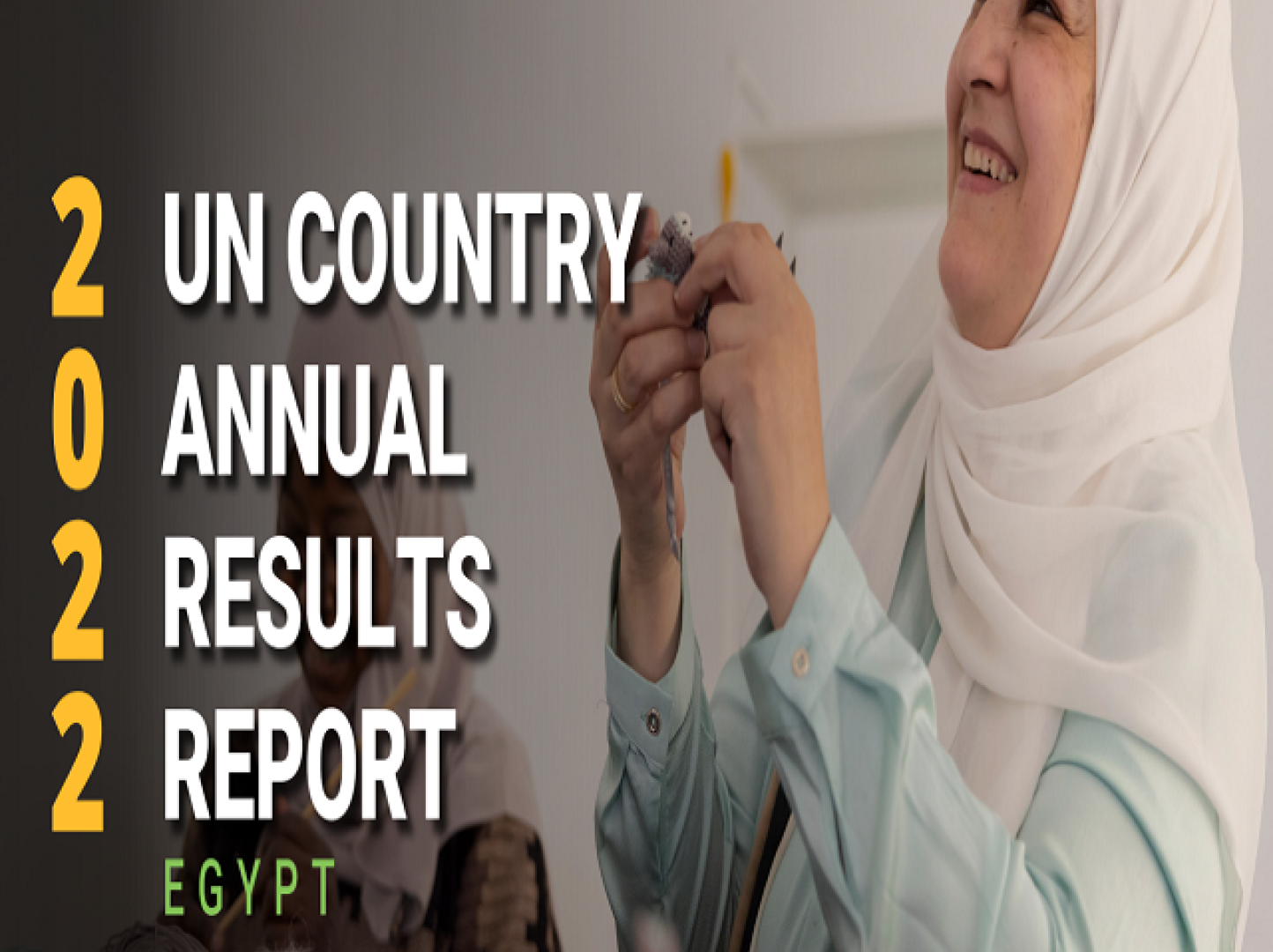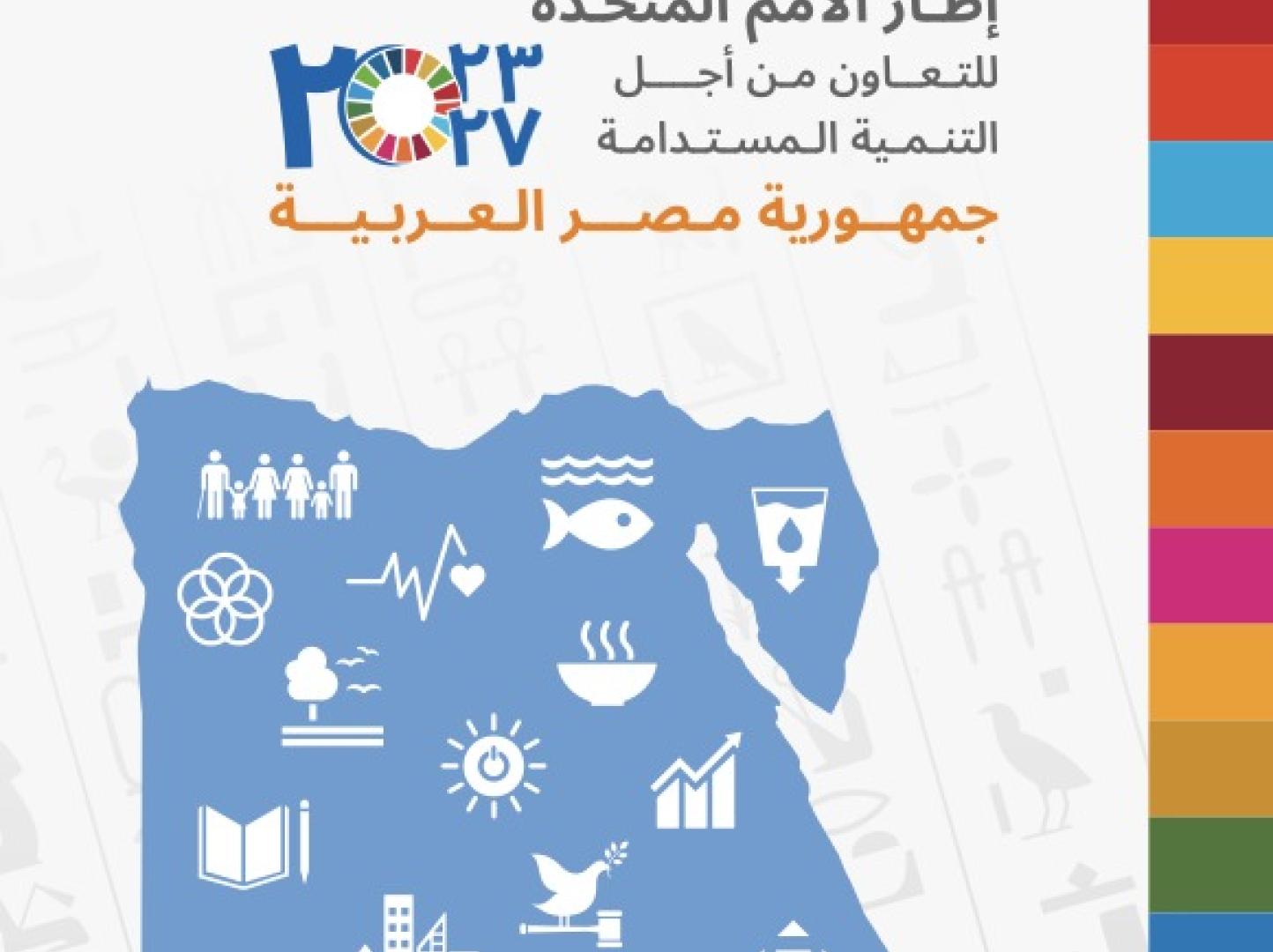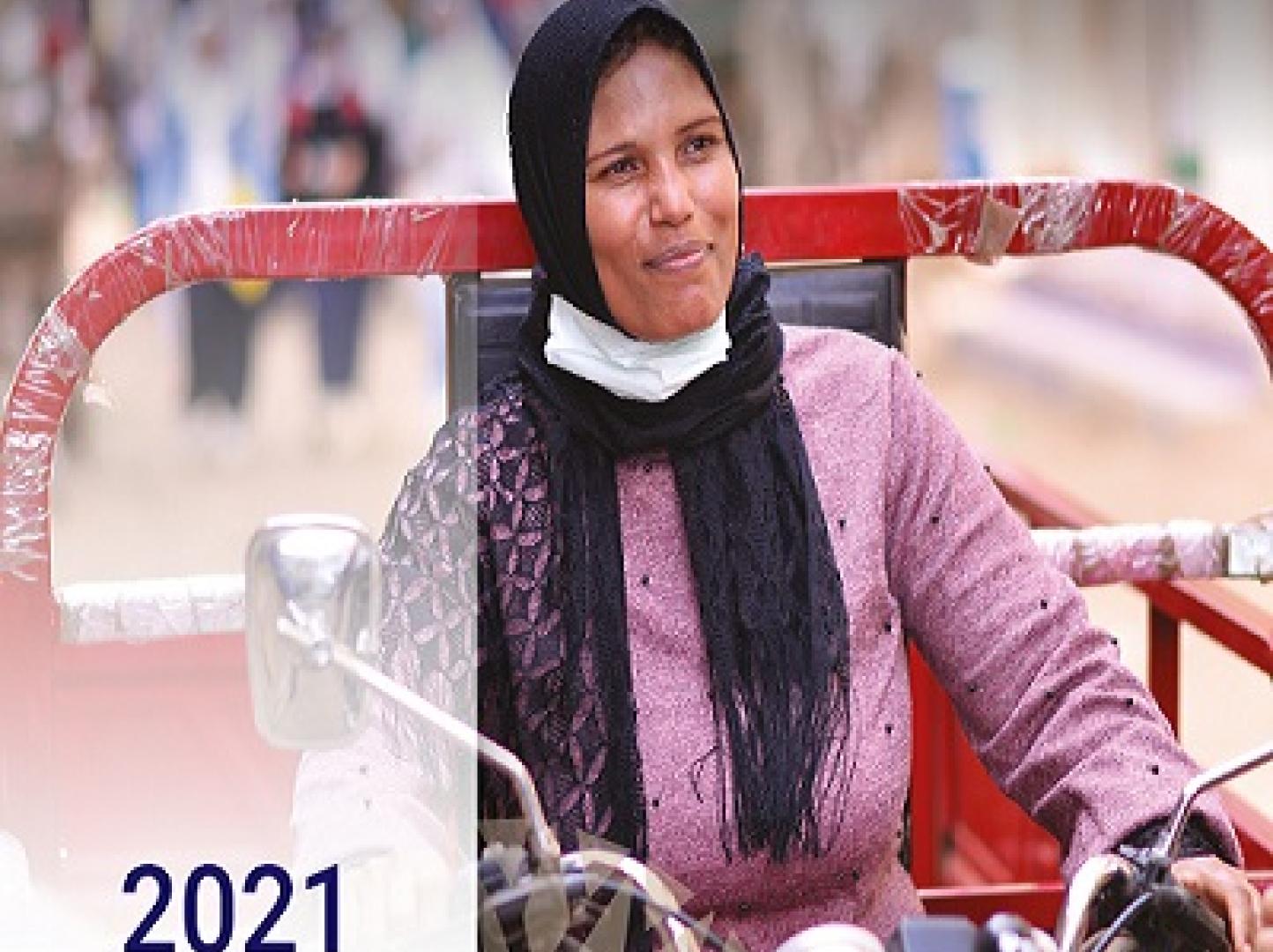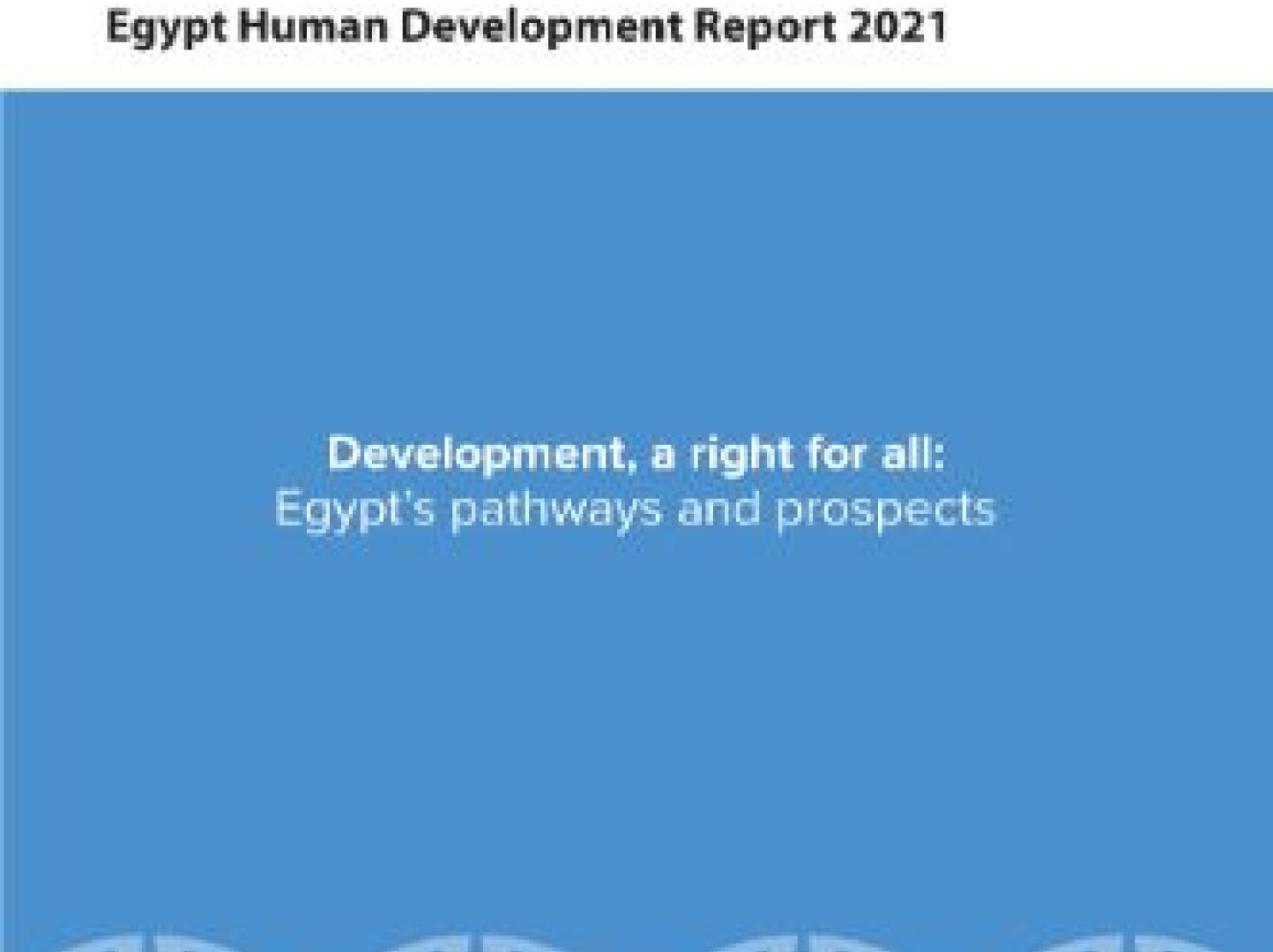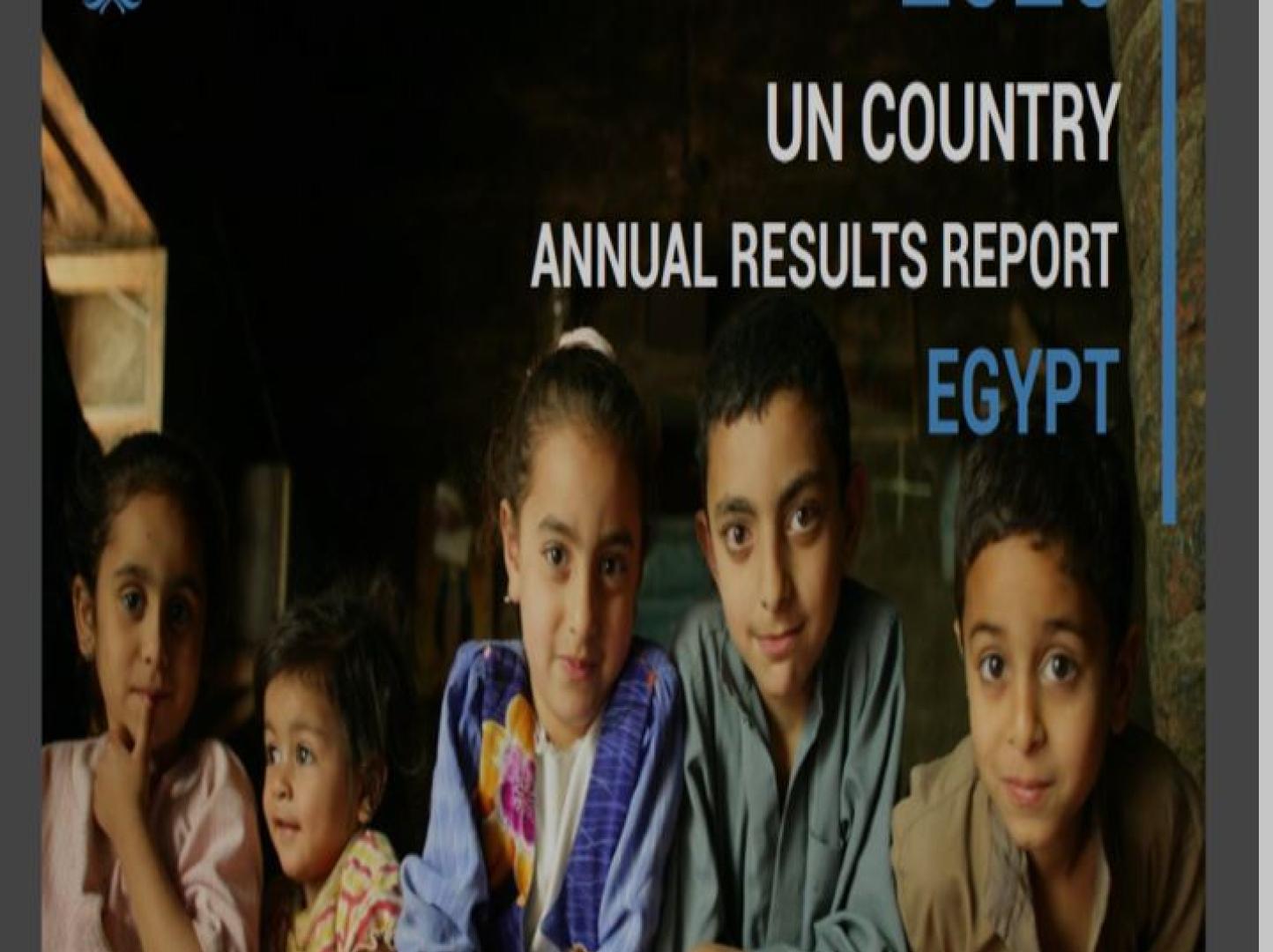Latest
Press Release
25 December 2024
UN General Assembly adopts landmark convention on cybercrime
Learn more
Press Release
22 December 2024
UN Emergency Fund allocates $6 million to support refugees fleeing Sudan in Egypt
Learn more
Press Release
19 December 2024
The Secretary-General’s video message to 11th Summit of D-8 Organization for Economic Cooperation
Learn more
Latest
The Sustainable Development Goals in Egypt
The Sustainable Development Goals are a global call to action to end poverty, protect the earth’s environment and climate, and ensure that people everywhere can enjoy peace and prosperity. These are the goals the UN is working on in Egypt:
Story
30 May 2024
Towards More Effective, Fit for Future UN Peacekeeping operations
Op-edBY Ambassador Ahmed Abu Zeid, Spokesperson for the Ministry of Foreign Affairs and Director of Public Diplomacy DepartmentElena Panova, UN in Egypt Resident Coordinator As we mark the 76th anniversary of United Nations Peacekeeping Operations, we are reminded of the long and proud history, with more than one million peacekeepers having served in more than 70 operations on four continents since its establishment in 1948. Over the past seven decades, UN peacekeepers have tirelessly worked to mitigate conflicts, protect civilians, provide basic security guarantees, respond to crises and facilitate the transition to sustainable peace in some of the world's most challenging settings. In doing so, they have helped countries close the chapter of conflict and open a path to sustainable development, even if major peacebuilding challenges remain.Egypt has been a key supporter of UN peacekeeping efforts, contributing troops, police, civilians, and expertise to numerous missions across the globe. It built up an impressive record of peacekeeping achievements over more than 60 years of its existence. Egypt is one of the key countries that made these successes possible. Since 1960 when it first sent troops to the UN Operation in Congo, more than 30,000 Egyptians have served in 37 peacekeeping missions in 24 countries.As one of the largest contributors of uniformed personnel to UN Peacekeeping, Egypt currently deploys 1602 military and police personnel to the UN peace operations in Abyei, the Central African Republic, the Democratic Republic of the Congo, South Sudan, and the Western Sahara.As impressive as Egypt’s peacekeeping achievements are over more than 60 years of peacekeeping operations existence, so is Egypt’s sacrifice, with 60 brave Egyptian blue helmets paying the ultimate sacrifice in service of peace.Egypt’s service and sacrifice are recognized globally, demonstrated by its re-election as rapporteur of the UN Special Peacekeeping Operations Committee and its recent election as Chair of the UN Peacebuilding Commission. Furthermore, the adoption of the Cairo Roadmap on Enhancing Peacekeeping Operations as the African Union’s position shows Egypt’s strong leadership in this area.And through the Cairo International Center for Conflict Resolution, Peacekeeping and Peacebuilding (CCCPA), indeed, Egypt has provided a leading voice from the Global South on a wide range of topics, including conflict prevention and resolution, peacekeeping and peacebuilding. The CCCPA stands out as an African Union Center of Excellence, and the only civilian training center on issues of peace and security. Through effective partnership with the United Nations Family in Egypt, CCCPA has emerged as a pillar for fostering dialogue, negotiation and mediation; early warning and early response and crisis management in Africa and the Arab world.In today's complex and evolving security landscape, the need for effective multilateral cooperation has never been greater. Conflicts continue to erupt, often with devastating humanitarian consequences. UN peacekeeping missions are also facing unprecedented, growing threat from the weaponization of digital tools, with hate speech, misinformation, and disinformation undermining their vital work, and fueling violence against peacekeeping personnel, partners, and communities. The United Nations chose as theme for this year’s International Day of UN Peacekeepers: “Fit for the future, building better together,” pointing out the paramount importance for peacekeeping operations to adapt to the changing political landscape and nature of conflicts which have become more complex and interconnected. As peacekeeping has evolved to reflect the populations they serve, women have become increasingly part of the peacekeeping family – making operations more effective. It’s also an area where Egypt has been an active player, with Egyptian female peacekeepers – currently 102 brave Egyptian women are serving with 5 missions across Africa - considered as role models in the peacekeeping missions where they serveIn the words of the UN Secretary-General António Guterres, “in order for our peacekeepers to respond to the challenges of today and tomorrow, they need the world’s support.” In this regard, countries will not be able to address conflict prevention and resolution in an inclusive and sustainable manner without taking into account young people’s perspectives in planning and decision-making. The UN Security Council Resolution #2250 on Youth, Peace and Security is a landmark as it acknowledges the important role youth can play in the prevention and resolution of conflicts.Furthermore, the climate crisis poses an increasing threat to global peace and security, with rising sea levels, droughts, floods and other climate-related events, and highlights the need for UN peace operations around the world to adapt and mitigate the risk of climate driven conflicts. Despite its limited contribution to global warming, Africa disproportionately faces the worst of climate change impacts. The COP27 Presidency’s flagship initiative titled “Climate Responses for Sustaining Peace” (CRSP), has taken a leading role in this regard, by spearheading a discussion on how climate change may exacerbate the risks of violence, conflict or other national vulnerabilities, and the need to approach these through a multifaceted and holistic way. Egypt took the initiative even further by launching the Aswan Forum for Sustainable Peace and Development. The forum, with the next edition scheduled for 2-3 July in Cairo, provides the first of its kind platform in Africa to address the interlinkages between peace and development, championing Africa-led solutions and addressing peacebuilding through a climate lens.Looking ahead, this International Day of UN Peacekeepers reminds us that collective commitment to a stronger engagement for advancing political solutions to conflict is needed more than ever. As the Secretary-General puts it, “UN Peacekeeping is a remarkable enterprise of multilateralism and international solidarity.” In September, member states will meet at the Summit of the Future, where they will jointly tackle how to respond to the world's emerging threats. In this important forum, UN member states have a responsibility to champion multilateralism, join forces and chart a more effective, accountable and inclusive peacekeeping operations, as laid out in the New Agenda for Peace." The New Agenda for Peace is the UN Secretary-General’s vision for strengthening multilateral action for peace, based on international law, in a world in transition.
1 of 3

Story
10 November 2024
WUF12: Egypt’s National Initiative for Smart Green Projects highlighted as model for localizing climate action and promoting sustainable urbanization
As part of the Twelfth Session of the World Urban Forum (WUF12) in Cairo, a high-level session highlighted Egypt’s National Initiative for Smart Green Projects (Egypt SGP) as a leading model for localizing climate action and promoting sustainable urban development through local solutions and innovations.The session was moderated by Ambassador Hisham Badr, the National Coordinator of the initiative, and attended by Dr. Rania Al-Mashat, Minister of Planning, Economic Development, and International Cooperation; Michal Mlynár, Deputy Executive Director of UN-Habitat; Elena Panova, UN Resident Coordinator in Egypt; and Alessandro Fracassetti, UNDP Resident Representative in Egypt. Speakers at the session emphasized the need to scale up successful projects like the National Initiative for Smart Green Projects to achieve a broader global impact, with Minister Mashat emphasizing the significance of multi-sector collaboration to ensure that sustainable solutions are scalable and aligned with global climate goals.Mr. Mlynár commended Egypt SGP as reflecting Egypt’s commitment to localizing climate action and promoting sustainable urban development, noting that the initiative provides local solutions “and we need local solutions.” Ms. Panova congratulated the Government of Egypt for the Egypt SGP, adding that highlighting the initiative at WUF means it can be a model for other countries. She also noted that the UN wide-ranging support to the initiative throughout its three phases. Addressing attending representatives of the winning projects in the initiative, Panova said, “your commitment, your expertise, and your vision shows us how much knowledge, innovation, and passion exists here in Egypt that can be tapped to help address the challenges of climate change.”For his part, Alessandro Fracassetti, UNDP Resident Representative in Egypt, underscored the broader importance of SGP Egypt, stating, "By partnering with SGP Egypt, we are not only driving local climate action but also setting a model for the rest of the world."“By highlighting the achievements of SGP Egypt’s winners, we aim to inspire other countries and regions to adopt a similar model—one that empowers local communities, fosters innovation, and ensures broad participation in the global effort to combat climate change,” said Amb. Hisham Badr, National Coordinator of SGP Egypt. The 12th edition of the World Urban Forum (WUF12), co-hosted by UN-Habitat and the Government of Egypt in Cairo, is focusing on transformative solutions for sustainable urban development. This year’s forum is especially significant as it returns to Africa, with Cairo, a city grappling with both rapid urbanization and climate challenges, providing the backdrop. A key feature of the forum is Egypt’s National Initiative for Smart Green Projects (SGP Egypt), which incorporates green solutions such as sustainable urban design, low-carbon transportation, and energy-efficient buildings into urban planning. The initiative also prioritizes empowering women and youth, acknowledging their vital role in advancing climate action. SGP Egypt is showcased as a global model for climate action, illustrating the effectiveness of local partnerships in addressing urban sustainability issues. The initiative has already supported innovative projects across all 27 of Egypt’s governorates, tackling challenges such as renewable energy, waste management, and low-carbon transportation. These solutions, while tailored to local contexts, are scalable and can serve as inspiration for cities worldwide. The initiative’s success in engaging youth is particularly noteworthy, with many youth-led projects focusing on climate solutions and it offers a global model for addressing climate change through collaborative, local, and innovative solutions.
1 of 3
Video
05 March 2024
"Voices of Impact" podcast opening episode features UN Egypt Resident Coordinator
The United Nations Information Centre in Cairo announced the launch of its new podcast, "Voices of Impact: UN in Egypt", with the UN in Egypt Resident Coordinator, Elena Panoa, being its first guest. This flagship podcast is set to shed light on the significant work carried out by the United Nations in Egypt, marking an important milestone in the enduring and successful partnership between the United Nations and Egypt, as a founding member of the international organization.“Voices of Impact: UN in Egypt" serves as an inspiring platform to explore and highlight the impactful initiatives, programs, and collaborations led by the United Nations within the Egyptian context. Through engaging discussions, interviews, and narratives, the podcast aims to showcase the multifaceted efforts undertaken to address pressing global challenges while fostering development, sustainability, and peace in Egypt and beyond.A wide array of perspectives will be presented, including UN officials, governmental and non-governmental organization representatives, experts, influencers, beneficiaries, and community leaders. The podcast will provide a comprehensive and insightful overview of the United Nations' invaluable contributions to Egypt's development journey and its commitment to leaving no one behind.As the world faces increasingly complex challenges, the podcast will underscore the significance of multilateralism and international cooperation in tackling global issues effectively, by highlighting success stories, innovations, and collaborative partnerships. "Voices of Impact: UN in Egypt" aims to inspire individuals, communities, and stakeholders to actively contribute to positive change and sustainable development efforts.
1 of 3
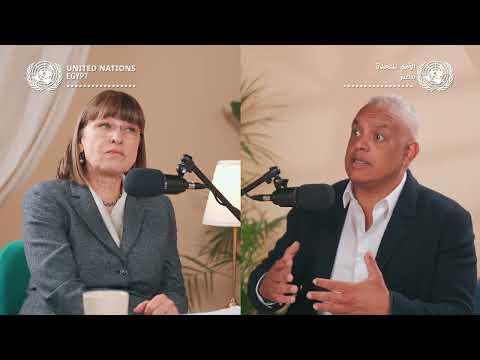
Story
01 December 2024
UN Egypt Resident Coordinator Participates in Arab League Event Commemorating International Day of Solidarity with the Palestinian People
The UN Resident Coordinator in Egypt, Elena Panova, participated in the Arab League's celebration of the International Day of Solidarity with the Palestinian People, organized by the General Secretariat of the Arab League. Panova delivered the UN Secretary-General's message on this occasion, in which he reaffirmed the United Nations' commitment to continue to stand in solidarity with the Palestinian people and their inalienable rights to live in peace, security and dignity.In her speech, Panova conveyed the message of UN Secretary-General António Guterres, who noted that this year’s commemoration is especially painful as the fundamental goals of dignity, rights, justice and self-determination of the Palestinian people are as distant as they have ever been. The Secretary-General’s message, read by the UN's highest-ranking representative in Egypt, stated: “It is past time for an immediate ceasefire and the unconditional release of all hostages; an end to the unlawful occupation of the Palestinian Territory – as confirmed by the International Court of Justice and the General Assembly; and irreversible progress towards a two-State solution, in line with international law and relevant UN resolutions – with Israel and Palestine living side by side in peace and security, and Jerusalem as the capital of both States.” The Secretary-General also called for full support for life-saving humanitarian relief to the Palestinian people, specifically through the work of UNRWA, the agency that serves as an indispensable lifeline for millions of Palestinians.In 1977, the General Assembly called for the annual observance of 29 November as the International Day of Solidarity with the Palestinian People (resolution 32/40 B). On that day, in 1947, the Assembly adopted the resolution on the partition of Palestine (resolution 181 (II))In resolution 60/37 of 1 December 2005, the Assembly requested the Committee on the Exercise of the Inalienable Rights of the Palestinian People and the Division for Palestinian Rights, as part of the observance of the International Day of Solidarity with the Palestinian People on 29 November, to continue to organize an annual exhibit on Palestinian rights or a cultural event in cooperation with the Permanent Observer Mission of Palestine to the UN.The resolution on the observance of the International Day of Solidarity with the Palestinian People also encourages Member States to continue to give the widest support and publicity to the observance of the Day of Solidarity.
1 of 5
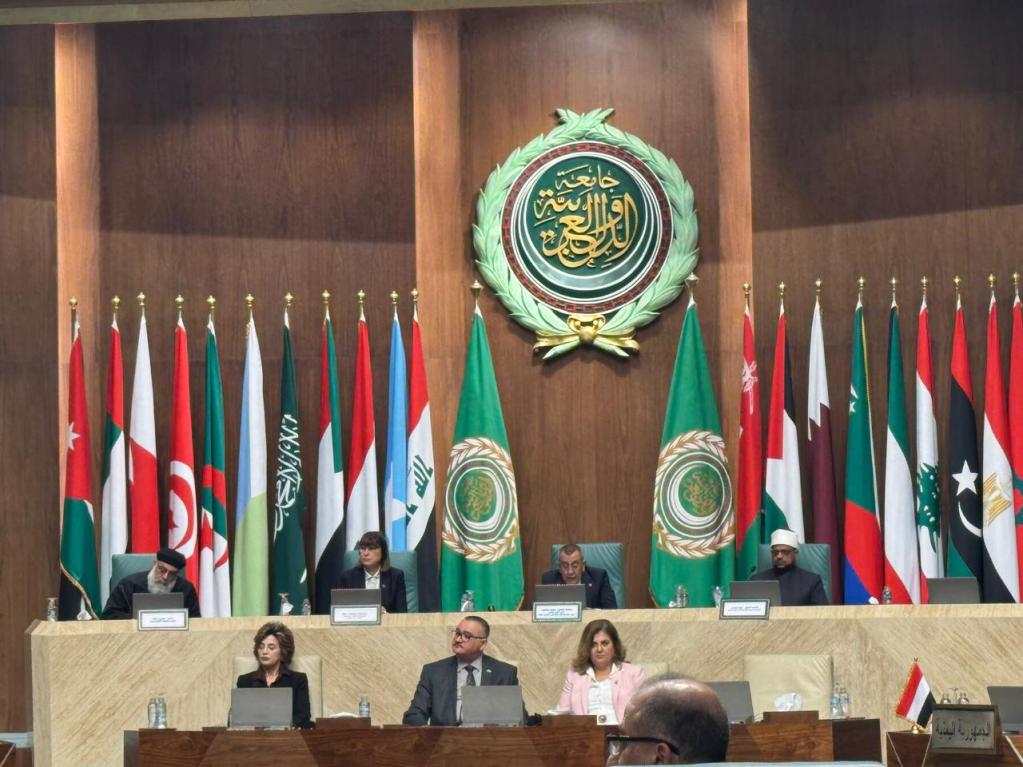
Story
18 November 2024
In celebration of United Nations Day, a strategic dialogue between Egypt’s Minister of Foreign Affairs and the United Nations aims to enhance coordination and streamline cooperation priorities
Cairo – Marking UN Day 2024 and reaffirming the robust partnership between Egypt and the United Nations, H.E. the Minister of Foreign Affairs and Emigration, Dr. Badr Abdelatty, hosted a strategic dialogue on 12 November 2024 at the Egyptian Ministry of Foreign Affairs. The event gathered senior representatives of the Ministry as well as representatives from the UN Country Team in Egypt, led by the UN Resident Coordinator, Elena Panova, and regional UN directors with a focus on enhancing coordination and streamlining priorities for cooperation. Ambassador Amr Aljowaily, Assistant Foreign Minister for Multilateral Affairs and International Security, moderated the meeting, which covered key areas of UN engagement in Egypt, as reflected in the joint UN-Government of Egypt Sustainable Development Cooperation Framework 2023-2027. Discussions highlighted critical areas of collaboration between the Ministry and the UN, focusing on shared priorities for advancing Egypt’s national development goals and responding to regional humanitarian crises in the region. Expressing her gratitude, UN Resident Coordinator in Egypt Elena Panova stated, “I would like to extend my sincere thanks to His Excellency Dr. Abdelatty, for hosting this important strategic dialogue. As the UN Resident Coordinator in Egypt, my role is to ensure that UN efforts are aligned and unified in support of Egypt’s Vision 2030 and national development priorities. Today’s meeting will help us to advance our joint priorities for sustainable development and humanitarian action.” The dialogue concluded with a commitment to deepen collaborative efforts and address existing and emerging regional challenges, with both sides emphasizing the importance of aligning strategies to support sustainable development, to scale-up humanitarian assistance, considering Egypt’s role in promoting peace and stability in the region.
1 of 5
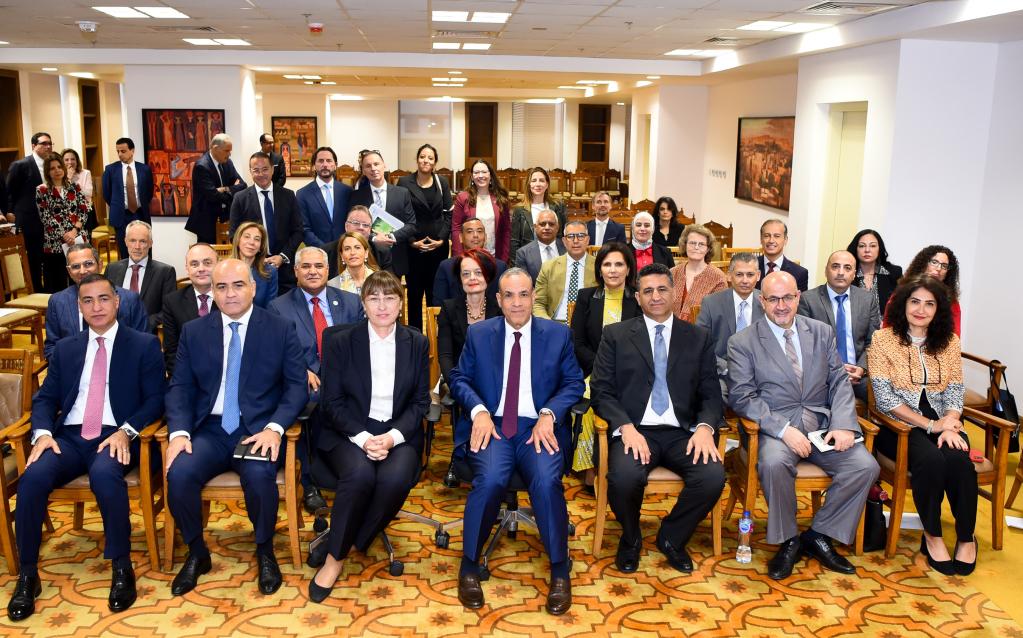
Story
10 November 2024
WUF12: UN Egypt Resident Coordinator Highlights Egypt’s Initiatives to Localize the Sustainable Development Goals
At the 12th session of the World Urban Forum (WUF12), currently held in Cairo, the UN Resident Coordinator in Egypt, Elena Panova, highlighted initiatives launched by the Egyptian government to support efforts to localize the Sustainable Development Goals (SDGs). She spoke during a session the event, “Boosting the localisation of the sustainable development goals to propel transformative change”, co-organized by the United Nations Joint SDG Fund and the Local2030 Coalition.The session, which included representatives from the governments of the United States, Spain, Costa Rica, and Kyrgyzstan, as well as the UN Joint SDG Fund and the Local2030 Coalition, saw Panova commend the “clear impact” of the Fund on the UN’s work in Egypt. She explained that the Fund has strengthened UN cooperation at the national level, with the funding provided by the Fund enabling coordinated approaches among UN agencies on key SDG areas. The Resident Coordinator emphasized that the Fund’s work has been impactful by focusing on a number of multi-dimensional SDG accelerators. She noted that, under the leadership of the Ministry of Planning, Economic Development and International Cooperation, the government has partnered with five UN agencies to develop the building blocks for an Integrated National Financing Framework. This includes a comprehensive financing strategy that serves as a roadmap to close financing gaps, enhance resource allocation to key sectors, unlock innovative financing, and stimulate private sector financing for sustainable development.Panova highlighted several initiatives launched by Egypt to support progress toward achieving the SDGs at the local level. These include “Hayah Karima” (Decent Life), a flagship initiative to improve the quality of life in poor villages, the release of sustainable development localization reports in 2021 covering all 27 governorates, and three voluntary local reviews from the governorates of Beheira, Fayoum, and Port Said, which were presented at the 2023 High-Level Political Forum (HLPF). At the same time, Panova pointed out challenges facing SDG localization in Egypt, including disparities in planning and monitoring capacities among governorates, the need to improve collaboration with local stakeholders, and to enhance the collection, management, and utilization of disaggregated data.Panova also said that the UN is in the process of establishing a new joint program, led by the Ministry of Planning, Economic Development and International Cooperation, in collaboration with three UN agencies—UN-Habitat, UNDP, and UNICEF. This program aims to strengthen local governance by integrating people-centered decision-making processes throughout the policy cycle, including planning, budgeting, and monitoring. She emphasized the significant role that the UN could play, stating that the joint program “can act as a catalyst for further cooperation and investment from the government, UN agencies, development partners, and the private sector.” The new joint programme will engage young people in various ways by including youth in all capacity building and participatory planning activities, policy dialogues for young people. “We will work with the new Local2030 Cairo Hub to disseminate successful models across Egypt, Africa and globally,” she added. The event brought together a diverse range of partners, with speakers highlighting the role of the UN Joint SDG Fund and the Local2030 Coalition in supporting national, regional, and local governments in overcoming financing challenges and advancing the SDGs at the local level, as well as showcasing successful initiatives from around the world. The UN Joint SDG Fund is the UN’s leading global fund dedicated to mobilizing the UN Development System and catalyzing policy and financing transformations to accelerate SDG efforts. The Fund has already invested nearly $79 million in supporting SDG localization actions. This includes initiatives working with local and regional stakeholders and governments to develop innovative policy solutions and financing mechanisms to mobilize local capital.
1 of 5
Story
10 November 2024
WUF12: ONE UN Roundtable Focuses on Supporting SDG Localization and Financing for Development
At the 12th edition of the World Urban Forum (WUF12), the “ONE UN Roundtable” continued to act as a central platform for the United Nations Development System (UNDS) to strengthen partnerships with multilateral development partners. The roundtable focused on bridging financing gaps in national SDG acceleration plans through enhanced collaboration between the UN System, Resident Coordinators, and multilateral development banks.The roundtable highlighted the necessity of pooled resources and coordinated efforts aligned with country-level priorities as established in the United Nations Sustainable Development Cooperation Framework (UNSDCF). UN-Habitat Executive Director, Anacláudia Rossbach, underscored the urgent need to increase financial investments to support the New Urban Agenda, stating that “addressing the global housing crisis is a high priority.” Rossbach emphasized that sustainable investments depend on well-planned urban development. Elena Panova, UN Resident Coordinator in Egypt, noted the strong commitment from roundtable participants to build inclusive, resilient, and financially sustainable urban spaces. She acknowledged the “gap between ambition and reality,” a divide often rooted in financing, and highlighted the importance of supporting local actors in advancing sustainable development on the ground.On the same page, the UN Resident Coordinators in Turkiye, Nepal, Senegal and Mexico echoed the need to leverage private and public resources to accelerate the SDG implementation as well as providing the needed technical assistance. Since its establishment at WUF10 in 2020, the roundtable has brought together UN entities, Resident Coordinators, multilateral development banks, and national government representatives, aiming to enhance the UN’s alignment with local and national priorities.In a world where more than 80 percent of Sustainable Development Goals (SDGs) are currently off-track, WUF12’s “ONE UN Roundtable” focuses on developing forward-looking strategies to support the UN’s integrated efforts toward SDG acceleration. Participants will discuss best practices from previous UN meetings, the High-Level Political Forum (HLPF) Ministerial Declaration, and recommendations from the Summit of the Future. The roundtable will also address the critical annual financing gap of $2.5 to $4 trillion for SDG implementation, as highlighted by the UN and development partners. A key priority for the “ONE UN” platform at WUF12 is enhancing partnerships with multilateral development banks to strengthen SDG financing, specifically for Least Developed Countries (LDCs), Landlocked Developing Countries (LLDCs), and Small Island Developing States (SIDS). These regions face unique challenges that necessitate tailored solutions and localized financing strategies. Accordingly, discussions will focus on improving the coordination between UNDS and other financial institutions to create a collaborative framework for bridging financial gaps in SDG implementation, particularly in line with the United Nations Sustainable Development Cooperation Framework (UNSDCF) and national agendas. Expected outcomes from the roundtable include a quantitative set of recommendations to strengthen collaboration on SDG financing and the qualitative identification of mechanisms to establish strategic partnerships between the UN and financial institutions. These insights will inform discussions at future global events, including the Fourth International Conference on Financing for Development in 2025, marking a critical step in addressing the financial and operational challenges of the SDG agenda.
1 of 5
Story
04 November 2024
WUF12: The ON UN Egypt Pavilion Highlights Efforts to Empower a New System of Balanced Cities in Egypt
Cairo - The One UN Egypt Pavilion at the 12th Session of the World Urban Forum (WUF12) today hosted a panel discussion, under the title “Balanced System of Cities for Green Transition and Inclusive Growth across the Urban-Rural Quantum”, aiming to launch a call for collective action to build on existing efforts in Egypt to address the imbalanced system of cities, through collective efforts to enable a new model of balanced cities that contributes to achieving sustainable development goals. UN-Habitat Egypt Country Director, Ahmed Rezk, moderated a vibrant panel discussion featuring the UN Resident Coordinator in Egypt, Elena Panova; Dr. Abdel Khalek Ibrahim, Assistant Minister of Housing; Dr. Hisham Elhelbawy, Assistant Minister of Local Development for National Projects and Director of the Local Development Program in Upper Egypt; Engineer Amr Lashin, Deputy Governor of Aswan; Mr. Guido Clare, Head of the Regional Center for North Africa and the Middle East at the European Investment Bank; Ms. Lamia Kamal-Chaoui, Director of the Entrepreneurship and Small and Medium Enterprises Centre and Regions and Cities at OECD; and Dr. Salma Yousry, Director of Urban Development Program at UN-Habitat.The session began with a welcoming note by the UN Habitat Egypt Country Director, followed by a technical presentation Dr. Salma Yousry, on the balanced system of urbanization. In her remarks during the session, UN Resident Coordinator in Egypt, Elena Panova, highlighted spatial imbalances in Egypt, citing Ministry of Planning and Economic Development data, which indicates that Greater Cairo generates 45% of Egypt's GDP, while Alexandria contributes 15%.Panova noted that Cairo particularly dominates the Egyptian economy, with jobs, major companies, and private investments concentrated in the capital city, while many other Egyptian cities lack the capacity for robust growth and job creation Meanwhile, the movement of people to Cairo and Alexandria—more than 70% of internal migration—increases pressure on services, housing, and jobs, she added. This all contributes to a vicious cycle: people leave smaller cities because of limited employment opportunities, which in turn further depresses the attractiveness of these areas as economic centers, leaving even fewer economic opportunities for the population,” Panova said. The UN Resident Coordinator in Egypt also highlighted the UN's role in coordinating various efforts to support more inclusive and balanced development that contributes to advancing the Sustainable Development Goals (SDGs) and the GDP growth. She explained that the UN's approach in Egypt toward more balanced development among different cities and regions relies on a coordinated effort across all UN agencies, which leverages the collective expertise of the UN system.For the UN in Egypt—according to Ms. Panova— this starts with our Cooperation Framework with the Government signed in 2023. We see this as our roadmap for collaborative action towards realizing the SDGs in Egypt.Panova mentioned that many UN agencies are already active at the local level across Egypt, working with diverse demographic, geographic, and economic sectors, which has made a difference in boosting development outside major urban areas. However, she pointed to the need to expand this work, noting that the UN in Egypt will soon launch a multi-agency program on SDG localization, involving UN-Habitat, the UNDP and UNICEF, to be financed by the Joint SDG Fund. With over 80% of global GDP generated in cities, urbanization is vital for prosperity. In Egypt, however, rapid urban growth has strained cities' capacity to meet population needs, exacerbated by climate change, leading to further inequality, increased migration patterns, and a widened poverty gap in many cities. This left 70% of Egyptian cities with low development capabilities, lacking productivity, quality of life, and access to resources. Egypt’s National Urban Policy seeks to balance this by enhancing city competitiveness, connectivity, and resilience. Through integrated development, including human capital growth, circular economy, and mainstreaming climate action, cities can support national growth and offer better opportunities for Egyptians.
1 of 5
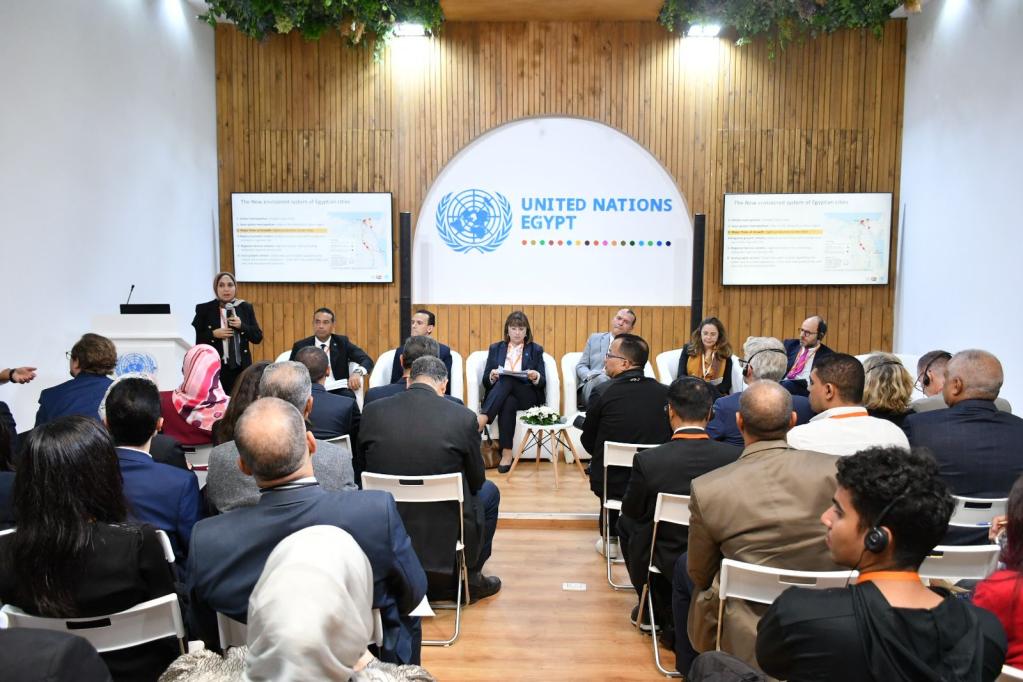
Press Release
25 December 2024
UN General Assembly adopts landmark convention on cybercrime
concluding a five-year negotiation process. The UN Convention against Cybercrime aims to prevent and combat cybercrime more efficiently and effectively, including by strengthening international cooperation and by providing technical assistance and capacity-building support, particularly for developing countries. “We live in a digital world, one where information and communications technologies have enormous potential for the development of societies, but also increases the potential threat of cybercrime. With the adoption of this Convention, Member States have at hand the tools and means to strengthen international cooperation in preventing and combating cybercrime, protecting people and their rights online,” said the President of the UN General Assembly Philémon Yang. The UN Office on Drugs and Crime (UNODC) served as secretariat to the negotiations. “The adoption of this landmark convention is a major victory for multilateralism, marking the first international anti-crime treaty in 20 years. It is a crucial step forward in our efforts to address crimes like online child sexual abuse, sophisticated online scams and money laundering,” said UNODC Executive Director Ghada Waly. “In today’s digital age, cybercrime is becoming more pervasive and destructive, exploiting the vulnerable and draining trillions from our economies every year,” she added. “UNODC stands ready to support Member States in signing, ratifying and implementing this new treaty by providing countries with the tools, assistance and capacity-building support they need to protect their economies and safeguard the digital sphere from cybercrime.”The General Assembly adopted the resolution without a vote. UN Member States, with the input of civil society, academic institutions and the private sector, had negotiated the text for over five years. The Convention will open for signature at a formal ceremony to be hosted by Viet Nam in 2025. It will enter into force 90 days after being ratified by the 40th signatory. UNODC will continue to serve as secretariat to the Ad Hoc Committee, which is mandated to negotiate a draft protocol to supplement the Convention, as well as to the future Conference of the States Parties.To read the text of the Convention, click here.*****For further information please contact:Sonya YeeChief, UNODC Advocacy SectionMobile: (+43-699) 1459-4990Email: unodc-press[at]un.org
1 of 5
Press Release
22 December 2024
UN Emergency Fund allocates $6 million to support refugees fleeing Sudan in Egypt
The Rapid Response CERF allocation will strengthen the UNs efforts in Egypt, complementing the delivery of life-saving support, including emergency food and cash assistance, water, sanitation, and hygiene services, as well as enhanced protection for refugees.The ongoing conflict in Sudan, which escalated dramatically in April 2023, has resulted in the world’s fastest-growing refugee crisis. Recent data from the Government of Egypt indicates that Egypt now hosts an estimated 1.2 million Sudanese making it the biggest recipient of Sudanese forced to flee the ongoing war.“As the number of refugees continues to rise daily and winter approaches, their needs are increasing,” said Elena Panova, the United Nations Resident Coordinator in Egypt. “These CERF funds will provide additional assistance and protection to newly arrived refugees, addressing both their immediate and long-term needs.”This marks CERF’s second allocation for Sudanese refugees in Egypt. The first, announced in May 2023, provided $5 million to support emergency needs over six months. That funding helped UN agencies and partners directly assist 320,000 people, including refugees and host communities. It supported cash transfers, protection services, responses to gender-based violence, food security, shelter, and other critical areas.About the CERFThe Central Emergency Response Fund (CERF) was established by the United Nations General Assembly in 2005 to enable rapid, life-saving humanitarian action in emergencies worldwide. CERF’s Rapid Response window allows humanitarian teams to act immediately, delivering coordinated and prioritized aid when crises emerge.For more Information, please contact:Naiera Ellethy, United Nations Office for the Coordination of Humanitarian Affairs, Regional Office for the Middle East and North Africa, naiera.ahmed@un.org Nihal El Kady, United Nations Information Centre in Cairo- Media and Administrative Specialist, el-kady@un.org
1 of 5
Press Release
19 December 2024
The Secretary-General’s video message to 11th Summit of D-8 Organization for Economic Cooperation
Excellencies, Ladies and gentlemen, My thanks to President Sisi for hosting this 11th Summit of D-8 Organization for Economic Cooperation and for recently bringing the international community together to focus on dire humanitarian needs in Gaza. I also want to recognize all of you for your unwavering solidarity with the Palestinian People. We must not relent to stop the nightmare and forge lasting peace. We are seeing some glimpses of hope in the region. In Syria, the United Nations is committed to supporting a smooth transition of power with an inclusive and credible political process reflecting the country’s diversity. And in Lebanon, it’s crucial for all parties to fully respect and swiftly implement the ceasefire agreement. Peace. Hope. And a better future for the people of the region and our world are fundamental. That’s what brings you together. As your summit theme rightly puts it, focusing on the future means investing in youth, in their ideas, energy and meaningful participation. And as you stress, this includes micro, small and medium enterprises. Around the world, these enterprises drive job creation, economic empowerment and poverty eradication. And they provide an entry point for young entrepreneurs to contribute to their community and local economy. That’s why the Pact for the Future includes a commitment to support youth entrepreneurs by increasing digital startups and micro, small and medium size enterprise. Fully unlocking all these potentials means actually two key areas. First, by massively investing in education skills and training for young people. That requires curricula adapted to the emerging green and digital economies, expanded support for teachers and trainers, and greater professional development in best ways as young people transition from the school to the workplace. Second, micro, small and medium enterprises the supportive environment in which to grow. They need access to finance, technology, markets and supply chains. And they need good governance, from licenses to taxation to help them thrive. Across all your countries, and all around the world, young people and small business can be a dynamic duo propelling growth and sustainable development. The United Nations looks forward to continuing work with the D-8 on all these critical issues. Together, let’s build our peaceful, sustainable and resilient world for today and tomorrow and, I thank you.
1 of 5
Press Release
17 December 2024
In Damascus, top UN envoy stresses need for credible, inclusive, ‘Syrian owned’ transition
The UN Independent Commission of Inquiry on Syria also called on Monday for all parties to prioritize the protection of civilians as the country grapples with a worsening humanitarian crisis and ongoing violence, including in the Golan. Special Envoy Geir Pedersen arrived in Damascus over the weekend, and on Sunday held meetings with key figures including leader of the new administration, Ahmed al-Sharaa – who formerly went by the nom de guerre, Mohammad Al-Jolani – and Mohammed al-Bashir, prime minister of the caretaker Government.Mr. Pedersen emphasized the need for a credible and inclusive Syrian-owned and led political transition based on the principles of Security Council resolution 2254 (2015).“The United Nations is committed to rendering all assistance to the Syrian people,” he said, according to statement from his office.UN chief welcomes commitment to protect civiliansIn response to the fast-changing developments in Syria, the UN chief despatched UN Emergency Relief Coordinator Tom Fletcher to also hold discussions with Mr. al-Sharaa and Mr. al-Bashir.In a statement released late on Monday, António Guterres welcomed the caretaker Government’s commitment to protect civilians, including humanitarian workers. "I also welcome their agreement to grant full humanitarian access through all border crossings; cut through bureaucracy over permits and visas for humanitarian workers; ensure the continuity of essential government services, including health and education; and engage in genuine and practical dialogue with the wider humanitarian community."Prison visitMr. Pedersen also visited the notorious prison complex of Sednaya, where thousands of Syrians were detained and tortured by the former regime, prompting many families to go in search of missing relatives in recent days. While there, he met mothers of some of those displaced, people newly liberated and lawyers handling some of the cases now pending.He also met with a delegation of the Syrian Negotiations Commission (SNC) comprising its different components of the SNC, including military representatives who have taken part in the recent military operations in Syria.Fighting continuesMeanwhile, fighting continues in the northern, eastern and northeastern parts of the country, while Israeli forces have advanced beyond the zone established by the May 1974 Agreement on Disengagement for the first time in 50 years, reportedly carried out more than 500 airstrikes since the overthrow of the Assad regime.United States forces also conducted dozens of airstrikes on alleged ISIL – or Dae’sh – terrorist group targets since 8 December, while reported airstrikes by Türkiye continued against targets linked to United States-backed Syrian Democratic Forces in the northeast.The UN Human Rights Council-mandated Independent Commission of Inquiry on Syria called on all parties to the conflict in Syria to protect civilians, and to treat those who have laid down their arms humanely.“The caretaker Government in Damascus as well as other parties in the Syrian conflict should ensure that their forces are abiding by their stated commitments to prevent violence and protect civilians, in particular the most vulnerable communities,” said Commission Chair Paulo Sérgio Pinheiro.Protect evidenceThe Independent Commission also stressed the need to safeguard evidence and crime scenes, including mass grave sites, for forensic documentation and analysis, as well as to help ensure future accountability.Thousands of civilians were killed after civil conflict erupted in the country in 2011 and countless more suffered gross human rights violations and abuses, including enforced disappearance.Commissioner Hanny Megally underscored the gravity of the situation, stating:“Syrians deserve justice after near 14 years of brutal war, where almost every crime listed in the Rome Statute has been committed. Perpetrators should be brought to justice, especially those most responsible, and Syrians must be in the lead in shaping the justice and accountability response.”“Full justice for victims and survivors will undoubtedly need to be broader than trials and they should be allowed to pursue their demands for truth, reparations and legal and institutional reforms,” he emphasised.© WFP/Emad EtakiChildren queue for hot food in Aleppo, Syria.Review sanctionsThe humanitarian crisis remains dire, with over one million displaced since late November and 17 million in urgent need of assistance. Capacity to support those newly displaced, as well as those returning, is overstretched and more support from the international community is urgently needed.The Independent Commission called on all Member States to support aid efforts, calling for the review and suspension of existing sanctions regimes, to ensure they are not impeding humanitarian efforts.“As we have seen, sanctions cause disproportionate harm to the poor and most vulnerable, and now is the time to give Syrians the chance to rebuild their own country,” said Commissioner Chair Pinheiro.Leading relief effortsIn response to escalating needs in Syria, UN agencies and humanitarian partners are delivering vital assistance, including food, water, cash, tents, blankets, medical teams, and critical supplies.UN Emergency Relief Coordinator Tom Fletcher said: “Behind the drama of what we are seeing on our screens are millions of human lives — people who want dignity, security, justice, and opportunities for their families,” he said at the Masnaa border crossing between Syria and Lebanon.“And that’s who we are here to support.”Tweet URL Restoring critical servicesOver the weekend, the UN Children’s Fund (UNICEF), in collaboration with the Syrian Arab Red Crescent (SARC) and the International Committee of the Red Cross (ICRC), conducted a joint mission to the Tishreen Dam in Aleppo governorate to enable urgent repairs.Hostilities near the dam last week caused extended power outages, disrupting water and other essential services relied on by millions of people in the area.UNICEF also secured fuel for the dam's backup generator, allowing for safe drainage and safeguarding water supplies for affected communities.Safe passage vital“According to partners, and as of [Sunday], over 40,000 displaced people are staying in and around collective centres across northeast Syria,” UN Spokesperson Stéphane Dujarric told reporters at the regular press briefing in New York.He reiterated the call from UN humanitarians that those fleeing fighting must be allowed to do so safely and voluntarily return when the situation allows.“Whether they leave or stay, people must be protected and able to access essential supplies for their survival.”
1 of 5
Press Release
15 December 2024
EUROPEAN UNION REPRESENTATIVES VISIT WFP PROJECTS IN EGYPT HIGHLIGHTING THE POSITIVE IMPACT OF JOINT INITIATIVES
The delegation, drawn from the Working Parties of the Council of the European Union, and consisting of representatives of the European institutions and 22 Member States, accompanied by representatives from WFP, UN sister agencies, and EU institutions — conducted field visits showcasing key initiatives. This included vocational training centres, WFP-supported agricultural projects, community schools, and women and children nutrition units. The visit is aligned with the priorities of the Hungarian Presidency of the Council, encouraging stronger European action on food security, which will be reflected in upcoming Council Conclusions on stepping up Team Europe support to Global Food and Nutrition Security. As global challenges like climate change, economic pressures, and development needs intensify, the partnerships between Egypt, the EU and its member states and WFP continue to demonstrate the importance of combining large infrastructure projects with locally driven initiatives, to create lasting and transformative change. The visit included vocational training sites established under WFP’s refugee programme, in partnership with the Arab Academy for Science, Technology & Maritime Transport, EU Member States and local organizations. The initiative provides market-driven skills training to refugees and host community members in carpentry, manufacturing, and digital tools, fostering self-reliance and economic inclusion. Showcasing agricultural innovations, the EU delegation met with smallholder farmers, supported by WFP and the Ministry of Agriculture and Land Reclamation, who have adopted enhanced agriculture techniques, such as solar-powered drip irrigation and land consolidation, which have boosted productivity by up to 40%. These practices offer sustainable solutions to challenges like climate change, resource scarcity, and food insecurity. The visit also focused on community education, with stops at WFP-supported schools in partnership with the Ministry of Education and Technical Education. WFP’s school feeding programme provides nutritional support and cash assistance to encourage attendance and continued education. Supported schools have also been equipped with digital tools and training for teachers to enhance the learning experience and ensure students have equal opportunities with their peers nationwide. The EU Member States representatives also explored WFP’s women’s empowerment programmes, developed with the Ministry of Social Solidarity. These initiatives provide women with training and micro-loans, enabling them to start their own businesses, increasing their household incomes by nearly 50%, and transforming their lives and those of their families. “Addressing today’s complex challenges requires solutions that empower communities, build resilience, and unlock opportunities,” said WFP Egypt Representative and Country Director Jean-Pierre de Margerie. “What we see in Aswan, as one example of our work, reflects the strength of our partnerships with the EU in cooperation with the Egyptian Government in transforming lives and sustainable growth.” On the nutrition front, the delegation visited health units under the Ministry of Social Solidarity’s (MOSS) “First 1,000 Days” Programme, supported by WFP. Delegates observed nutrition assessment screening for school-aged children and met with pregnant and breastfeeding women benefiting from the initiative that combats malnutrition and promotes maternal and child health during the formative years of a child’s life. Building on a longstanding partnership, WFP and the EU continue to drive impactful development across Egypt. Earlier this year, the EU and WFP launched a €2 million programme to empower 6,000 refugees and host community members through vocational training and private sector engagement, reinforcing their shared commitment to inclusive growth. In 2023, the European Union and its Member States' global contributions to WFP reached €2.4 billion — over 30% of WFP’s annual budget. # # # About WFP The United Nations World Food Programme is the world’s largest humanitarian organization saving lives in emergencies and using food assistance to build a pathway to peace, stability and prosperity for people recovering from conflict, disasters and the impact of climate change. Follow us on Twitter @WFP_Egypt And on Instagram @WFP_Egypt For more information, please contact: WFP Amina Alkorey, WFP/Cairo, email: amina.alkorey@wfp.org Kanzy Mahmoud, WFP/Cairo, email: kanzy.amr@wfp.org EU Rasha Serry, EU, email: rasha.serry@eeas.europa.eu
1 of 5
Latest Resources
1 / 11
1 / 11


















